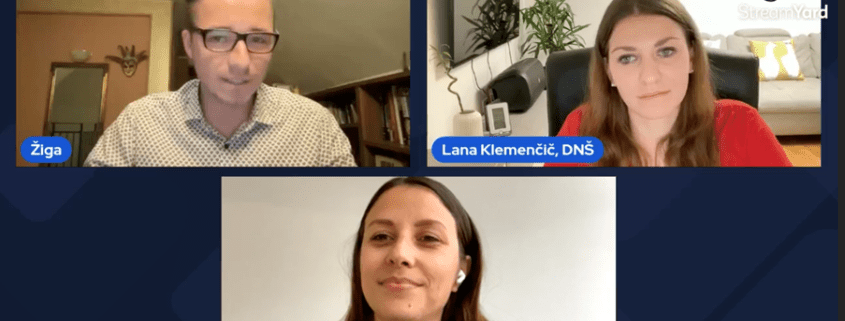On Wednesday, 30 March 2022, MEP Irena Joveva participated in an online round table on youth and education, which was organised by Žiga Papež, an LMŠ party candidate for the National Assembly elections. They were joined by Lana Klemenčič from the Novo mesto Students’ Association. They approached the topic from different angles and attempted to find answers and solutions.
They started by talking about their personal experiences in school and realised that all three of them had fond memories of their school years. However, they are concerned about the high unemployment rate among young people, which can be attributed to various factors. “There are many causes for it, from precarious work to temporary employment and lack of work experience,” said Joveva. She believes that young people have been particularly hard hit during the pandemic, which is why the EU has reacted swiftly by increasing funding to alleviate the situation, by promoting additional youth employment, and by allocating funds to young people under the Recovery and Resilience Facility. However, all powers with respect to the efficient use of funds lie with individual Member States. “The first thing to do is to create a European Education Area. It will focus on teachers, digital education, the green aspect and, above all, access to education. The challenges of the pandemic have further deepened the psychosocial problems of young people from the perspective of equality. School must be accessible to all and it is unacceptable that in 2020 so many children do not have a computer or a phone at home,” the MEP said indignantly. With increasing digitalisation, she also feels that a sense of moderation and maintaining human contact are important.
They also commented on the growing importance of non-formal education. According to Joveva, formal and non-formal education are complementary, but curricula should be overhauled in all countries and at all levels of education. Schools provide a certain body of knowledge, but the acquisition of more practical skills and experience is left up to the individual. The lifelong learning programme is very important, as are the Erasmus study exchange programmes, which Joveva still regrets not having taken advantage of herself: “Although, in principle, Erasmus provides formal education, it also offers many non-formal skills. The more you know, the bigger your worth. Conditioning is an important contributing factor, but so is character – curiosity and inquisitiveness are excellent assets.”
The panellists agreed that there truly are a lot of programmes and funding for youth and education at EU level. However, young people need to be better informed, motivated and encouraged to participate and undertake projects. It is important to recognise that every experience comes in handy at some point in life, and it is essential for the educational process to also start encouraging curiosity, inquisitiveness, critical thinking, creativity, innovation and entrepreneurship.




Leave a Reply
Want to join the discussion?Feel free to contribute!